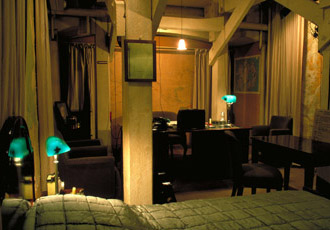
The Cabinet is the committee at the centre of the British political system and is the supreme decision-making body in government. Every Thursday during Parliament, Secretaries of State from all departments as well as other ministers - meet in the Cabinet room in Downing Street to discuss the big issues of the day. Government Cabinets have met in the same room since 1856, when it was called the Council Chamber. The Prime Minister chairs the meetings, selects its members, and also recommends their appointment as ministers by the Monarch. The present cabinet has 23 members (21 MPs and two peers), but a further three ministers attend the meetings, two peers and one MP. The Secretary of the Cabinet is responsible for preparing records of its discussions and decisions.
History of Cabinet
The modern history of the Cabinet began in the 16th Century with the Privy Council, a small group of advisers to the Monarch. Sir Robert Walpole the first Prime Minister, held occasional meetings of the King's Ministers - Cabinet - but not in its modern form.The 1832 Reform Act emphasised the need for government to have the confidence of Parliament as well as the Monarch and for it to act coherently.
William Pitt (1783-1801) established the right of the PM to ask ministers to resign. So the conventions of collective Cabinet responsibility and Prime Ministerial control developed. This enabled Ministers to stand together against Parliament under clear leadership. Up to 1916, a letter written by the PM to the Monarch was the only recorded decisions of Cabinet. In 1916 the 'War' Cabinet Secretariat and the post of Cabinet Secretary was created. The basic system has survived since then.
Parliament is an essential part of UK politics. Its main roles are:
Examining and challenging the work of the government (scrutiny)
Debating and passing all laws (legislation)
Enabling the government to raise taxes
The business of Parliament takes place in two Houses: the House of Commons and the House of Lords. Parliament examines and challenges the work of government. Parliament is responsible for approving new laws (legislation). Both Houses hold debates in which Members discuss government policy, proposed legislation and current issues. The origins of Parliament go back to the 13th century, so there are many rules about how it runs. A number of traditions are involved in the working of Parliament. Parliament and government both play a part in forming the laws of the United Kingdom. Along with the House of Commons and the House of Lords, the Crown is an integral part of the institution of Parliament. UK devolution created a national Parliament in Scotland, a national Assembly in Wales and a national Assembly in Northern Ireland (currently suspended). The UK is one of 25 member states of the European Union and is subject to European Union (EU) legislation.
Local Authorities
The UK is divided into a variety of different types of Local Authorities, with different functions and responsibillities, which are further subdivided in rural areas and some urban areas into parishes. Local Authorities are responsible for such matters as administering education, public transport, and the management of public spaces. Local authorities are often engaged in community politics. There are two common systems of local government in the UK: the old-style two-tier and newer single-tier system. The older (and far more complex) two-tier system consists of District Councils and County Councils. The District Councils are responsible for rubbish collection, granting planning permission and council housing. County Councils are responsible for education, social services, some public transport and other local functions. In Greater London, a unique two-tier system exists, with power shared between the London borough councils, and the Greater London Authority which is headed by an elected mayor.